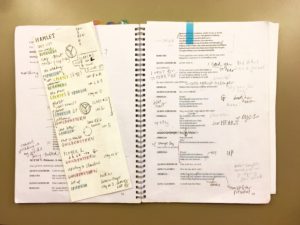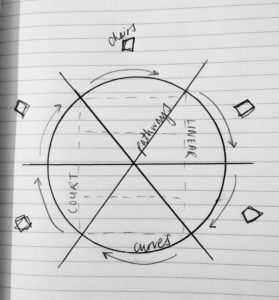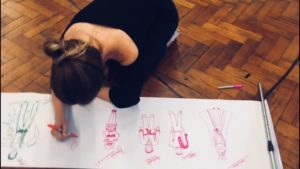By Grace Andrews
Greetings from South Bend! It’s the day before we open here at Washington Hall. The Indiana skies greeted us with low-lying cloud, a bruised purple haze and rumbling storms. The perfect backdrop for our tragedy.
Settling in at Notre Dame however, has been much more welcoming, and we feel instantly at home in this warm and dynamic environment. The American energy is empowering, and something about the space and air here fuels us with a renewed drive. Our horizons have been opened, and so have our minds – and our play begins to take on a new depth in our new context.
 With that freedom, come questions. We think we understand this play, the rise and fall within it, the undercurrents, the moments of oblivion. The challenge now is being open to the potential to re-learn, re-examine, and rejuvenate. Choices we made and loved back in London are tested, tried and sometimes thrown out. We grit our teeth, we smile, and sometimes we cry. The play and process demands a greater muscularity than ever, and we rise to meet it. As if under a microscope, we examine our roles and attempt to give them more life than before. I’m drawn back to an exercise I learnt whilst training, ‘I present. I share.’ The difference in these two small sentences is monumental. It is easy to present a clever idea. It requires much more courage to share your heart, but it has the power to unite us in what it means to be human.
With that freedom, come questions. We think we understand this play, the rise and fall within it, the undercurrents, the moments of oblivion. The challenge now is being open to the potential to re-learn, re-examine, and rejuvenate. Choices we made and loved back in London are tested, tried and sometimes thrown out. We grit our teeth, we smile, and sometimes we cry. The play and process demands a greater muscularity than ever, and we rise to meet it. As if under a microscope, we examine our roles and attempt to give them more life than before. I’m drawn back to an exercise I learnt whilst training, ‘I present. I share.’ The difference in these two small sentences is monumental. It is easy to present a clever idea. It requires much more courage to share your heart, but it has the power to unite us in what it means to be human.
Everyone works differently, but I am struck by the intensity of these final hours before we truly begin. I have been stuck on the Ophelia ‘madness’ scenes, and feeling decidedly wretched and defeatist about it, desperately trying to see some light. Part of the block comes from the songs, which are so exposing I want to run. I search, unrelatedly for a song on my Apple Music to make me feel better (get a grip, Grace!) and suddenly – there it is. An Anthony & The Johnsons song in which the lyrics are so brutally clear they make me see her for the first time in weeks. I think Ophelia wants Gertrude to be her friend. Her ally. She has the courage to cry for help, and ask the questions no one will face.
Hope there’s someone who’ll take care of me
When I die, will I go?
Hope there’s someone who’ll set my heart free
Nice to hold when I’m tired
There’s a ghost on the ‘rizon
When I go to bed
How can I fall asleep at night
How will I rest my head?
Oh I’m scared of the middle place
Between light and nowhere
I don’t want to be the one
Left in there, left in there





